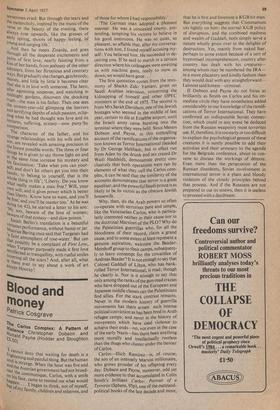Blood and money
Patrick Cosgrave
Carlos Complex: A Pattern of ,v Mance Christopher Dobson and o n a I d Payne (Hodder and Stoughton £5.50) :I.Cannot deny that waiting for death is a trightening and painful thing. But the human sc'til is strange. When the hour was five and and the cast the Austrian government had not broad (2'n communique, Carlos, with a smile his face, came to remind me what would nbalVen . • . I began to think, not of myself, tit c'f MY family, children and relatives, and
of those for whom I had responsibility.'
'The German man 'adopted a pleasant manner. He was a concealed enemy, pretending, tempting his victims to believe in his good intentions. He was so quiet, so pleasant, so affable that, after my conversations with him, f found myself accusing myself: You believed him. He succeeded in deceiving you. If he said to march in a certain direction where his colleagues were awaiting us with machine guns, ready to mow us down, we would have gone The first quotation comes from the testimony of Shaikh Zaki Yamani, given on Saudi Arabian television, concerning the kidnapping of himself and other OPEC ministers at the end of 1975. The second is from Mrs Sarah Davidson, one of the Jewish hostages who seemed in the middle of last year, certain to die at Entebbe airport, until the Israeli army came bursting into the terminal where they were held. Since Messrs Dobson and Payne, in this enthralling account of the ramifications of the organisation known as Terror International (headed by Dr George Habbash, but in effect run from Aden by the drunk and sex crazed Dr Wadi Haddeid), demonstrate pretty conclusively that both operations were run by elements of what they call. the Carlos complex, it can be said that the similarity of the accounts demonstrates that terror is a great equaliser, and the powerful Saudi prince is as likely to be its victim as the obscure Jewish housewife.
Why, then, do the Arab powers so often co-operate with terrorists pure and simple, like the Venezuelan Carlos, who is particularly interested neither in their cause nor in the doctrinal Marxism of the PLO? Why do the Palestinian guerrillas who, for all the bloodiness of their record, claim a grand cause, and to some extent at least represent a genuine aspiration, welcome the BaaderMeinhoff group to their camps, subsequently to learn contempt for the cowardice of Andreas Baader? It is not enough to say that Colonel Gaddafi of Libya, who has bankrolled Terror International, is mad; though he clearly is. Nor is it enough to say that only among the ranks of the gun-mad crazies who have dropped out of the European and Japanese middle classes can the Palestinians find allies. For the stark contrast remains. Never in the modern history of guerrilla movements has there arisen such intense political conviction as has been bred in Arab refugee camps; and never in the history of movements which have used violence to achieve their ends—no, not even in the case of the early Nazis—has there been anything more morally and intellectually rootless than the thugs who cluster under the banner of Carlos.
Carlos—Illich Ramirez—is, of course, the son of an intensely Marxist millionaire, who grows prouder of his offspring every day. Dobson and Payne, moreover, add yet more evidence to that accumulated in Colin Smith's brilliant Carlos: Portrait of a Terrorist (Sphere, 95p), one of the outstandpolitical books of the last decade and more, that he is first and foremost a KGB hit man. But everything suggests that Communism sits lightly on him: the eternal KGB policy of disruption, and the combined madness and wealth of Gaddafi, both simply serve a nature wholly given over to the delights of destruction. Yet, mainly from naked fear, perhaps to some extent because of a sort of hypnotised incomprehension, country after country has dealt with his creatures— among whom may be numbered the IRA— in a more placatory and kindly fashion than they would deal with any straightforward-I almost said honest—criminal.
If Dobson and Payne do not focus as brilliantly as Smith on Carlos and his immediate circle they have nonetheless added considerably to our knowledge of the ramifications of Terror International. They have confirmed an indisputable Soviet connection, which could in any event be deduced from the Russian weaponry most terrorists use. If, therefore, it is too early or too difficult to explain the psychological genesis of these creatures it is surely possible to add their activities and their armoury to the agenda for the Belgrade conference, about to convene to discuss the workings of détente. Even more than the persecution of the Russian dissidents, Soviet involvement in international terror is a plain and bloody violation of the cloudy principles behind that process. And if the Russians are not prepared to cut its sinews, then it is useless to proceed with a daydream.






































 Previous page
Previous page